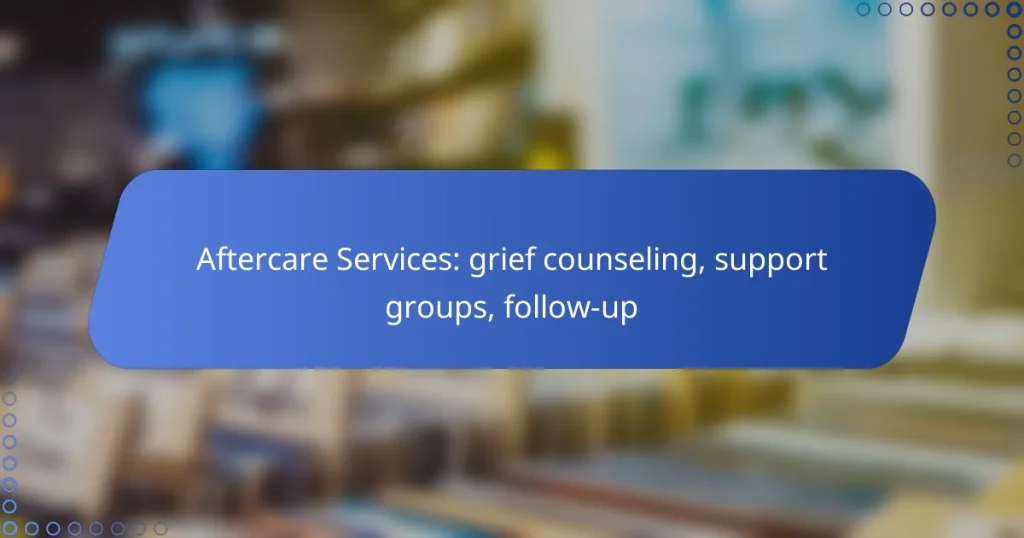Aftercare services for grief in Canada encompass grief counseling, support groups, and follow-up care, all designed to assist individuals in navigating their loss. These services provide essential emotional support, helping individuals express their feelings and develop coping strategies while fostering a sense of community through shared experiences.
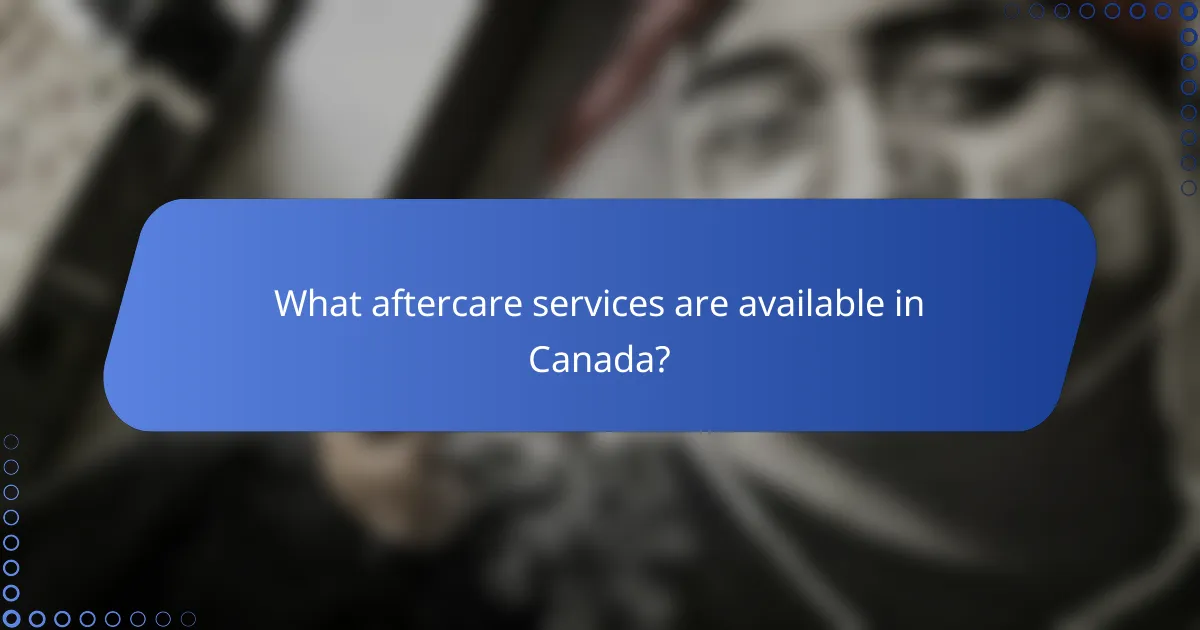
What aftercare services are available in Canada?
In Canada, aftercare services for grief include grief counseling, support groups, and follow-up care options. These services aim to help individuals cope with loss and provide ongoing support during the healing process.
Grief counseling services
Grief counseling services in Canada are designed to provide emotional support and guidance to those experiencing loss. These services are often offered by trained professionals, such as psychologists or social workers, who specialize in bereavement.
Individuals can access grief counseling through private practices, community health centers, or hospice organizations. Sessions may be conducted one-on-one or in small groups, allowing for personalized attention and shared experiences.
Support groups for bereavement
Support groups for bereavement offer a communal space for individuals to share their feelings and experiences related to loss. These groups are typically facilitated by a trained leader and can vary in structure, from open discussions to more structured formats.
In Canada, many organizations, including hospitals and non-profits, provide these support groups free of charge or for a nominal fee. Participants often find comfort in connecting with others who understand their grief, which can foster healing and resilience.
Follow-up care options
Follow-up care options are essential for individuals navigating the grieving process. This may include additional counseling sessions, check-ins from healthcare providers, or referrals to other mental health services as needed.
In Canada, some bereavement programs offer structured follow-up care that can last several months, ensuring ongoing support. It’s important for individuals to communicate their needs and seek help if they feel overwhelmed or stuck in their grief journey.
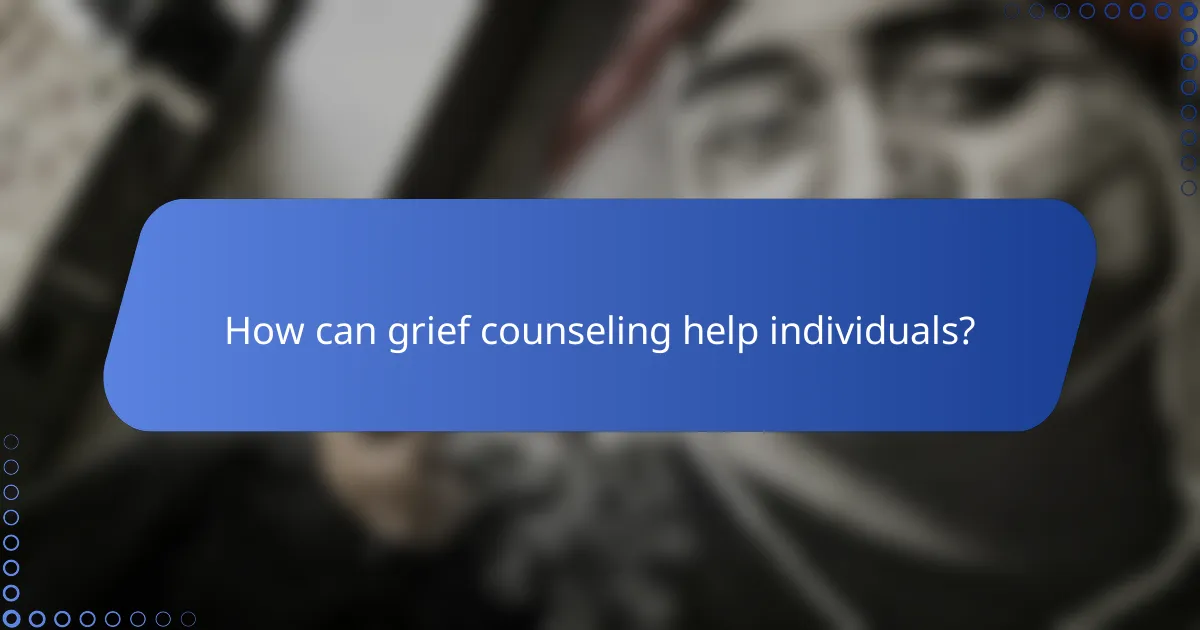
How can grief counseling help individuals?
Grief counseling provides essential support to individuals coping with loss, helping them navigate their emotions and find healing. It offers a structured environment where individuals can express their feelings and learn effective coping mechanisms.
Emotional support and coping strategies
Grief counseling offers emotional support by creating a safe space for individuals to share their experiences and feelings. Counselors are trained to listen empathetically, allowing clients to process their grief without judgment.
In addition to emotional support, counselors provide coping strategies tailored to individual needs. Techniques may include mindfulness practices, journaling, or guided imagery, which can help individuals manage overwhelming emotions and reduce anxiety.
Personalized therapy sessions
Personalized therapy sessions in grief counseling focus on the unique experiences of each individual. Counselors assess personal circumstances, cultural backgrounds, and specific grief reactions to tailor their approach effectively.
These sessions can vary in frequency and duration, often ranging from weekly to bi-weekly meetings, depending on the individual’s needs. This personalized attention ensures that clients receive the most relevant support, enhancing their healing process.
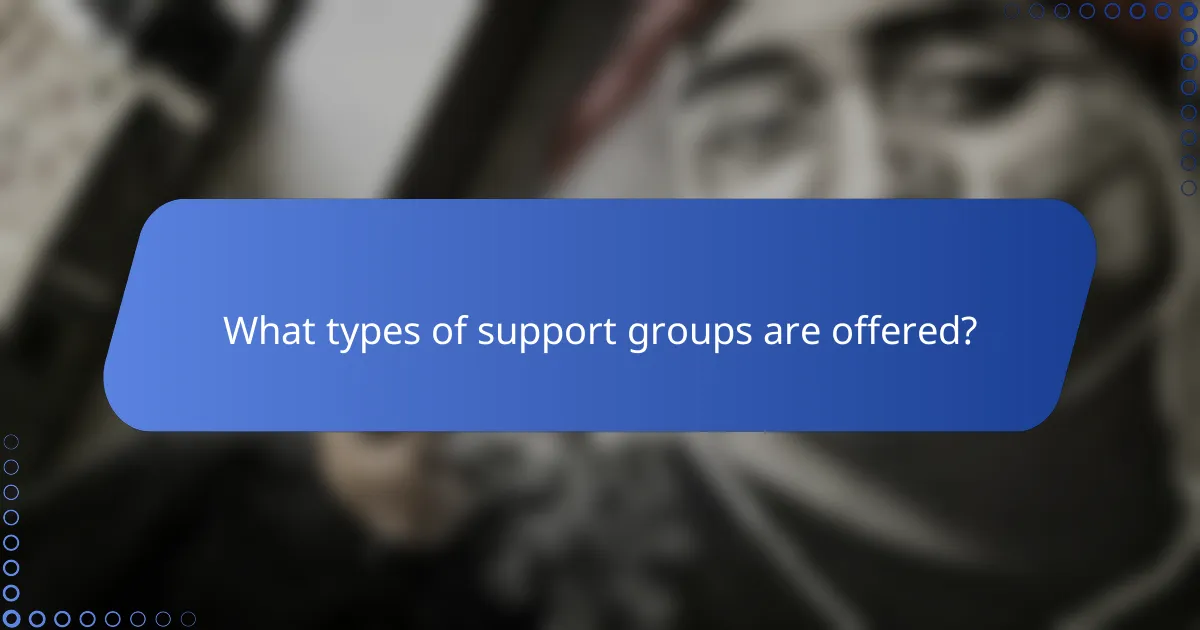
What types of support groups are offered?
Support groups typically fall into two main categories: peer-led and professional-led. Each type provides unique benefits and structures, catering to different needs in the grieving process.
Peer-led support groups
Peer-led support groups are facilitated by individuals who have experienced similar losses, fostering a sense of shared understanding. These groups often create a safe space for participants to express their feelings and share coping strategies.
In these settings, members can connect with others who are navigating similar grief journeys, which can be comforting and validating. Sessions may vary in frequency, often meeting weekly or bi-weekly, and can be found in local community centers or online platforms.
Professional-led support groups
Professional-led support groups are conducted by trained counselors or therapists who guide discussions and provide expert insights. These groups often incorporate therapeutic techniques and structured activities to help participants process their grief more effectively.
While peer-led groups focus on shared experiences, professional-led groups may offer more in-depth psychological support. They typically require a fee, which can range from nominal to moderate, depending on the provider and location. It’s advisable to check if your insurance covers these services.
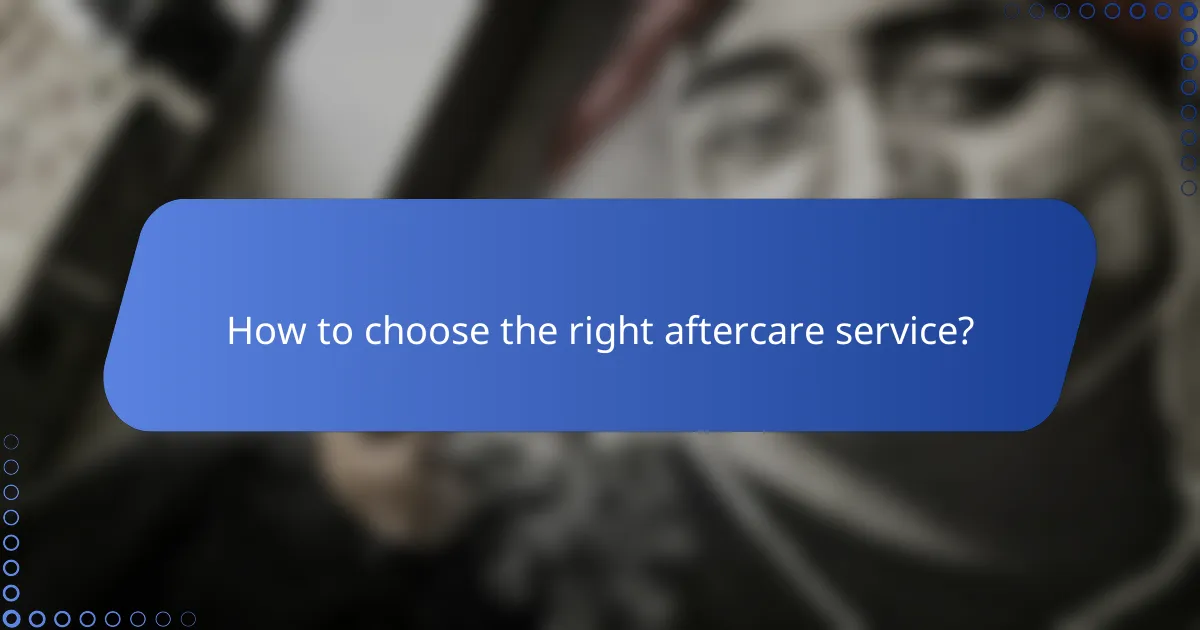
How to choose the right aftercare service?
Selecting the right aftercare service involves evaluating your specific needs and the types of support available. Consider factors such as the type of grief you are experiencing, the format of support (individual or group), and the qualifications of the providers.
Factors to consider when selecting services
When choosing aftercare services, assess the qualifications of the counselors or facilitators. Look for licensed professionals with experience in grief counseling, as they can provide tailored support based on your situation.
Consider the format of the service. Some individuals may benefit from one-on-one counseling, while others might find comfort in support groups where shared experiences can foster healing. Availability and accessibility of services, such as in-person versus online options, are also crucial.
Questions to ask providers
Before committing to a service, ask potential providers about their experience with grief counseling. Inquire about their approach and methods to ensure they align with your needs.
Additionally, ask about the structure of the sessions, including duration and frequency. Understanding the costs involved, whether they accept insurance, and any sliding scale options can help you make an informed decision.
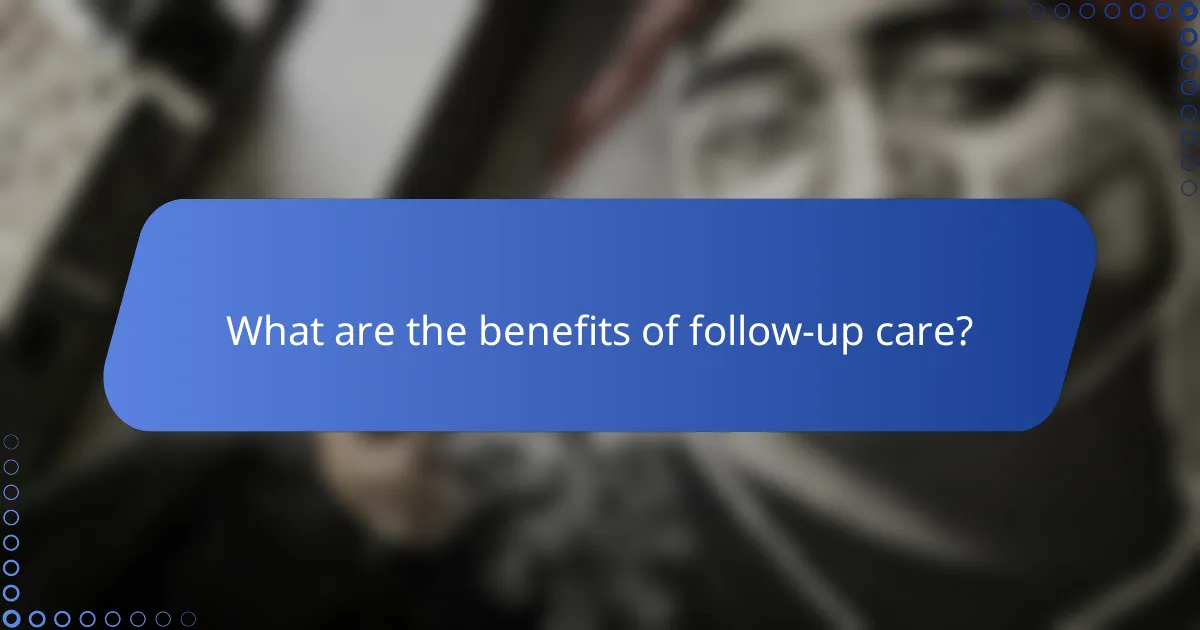
What are the benefits of follow-up care?
Follow-up care provides essential support and resources for individuals navigating grief, helping them cope with their emotions and adjust to life changes. This ongoing assistance can significantly enhance emotional well-being and facilitate healing over time.
Continued emotional support
Continued emotional support is crucial for individuals dealing with grief, as it offers a safe space to express feelings and share experiences. Regular check-ins with a counselor or participation in support groups can help individuals feel less isolated and more understood.
Support groups, whether in-person or online, allow individuals to connect with others who share similar experiences. This connection fosters a sense of community and belonging, which can be vital during the grieving process.
Monitoring progress and adjustments
Monitoring progress in grief recovery is essential to ensure that individuals are moving forward in a healthy manner. Follow-up care allows counselors to assess emotional states and identify any persistent challenges that may require additional strategies or interventions.
Adjustments to coping strategies can be made based on individual needs, ensuring that the support remains relevant and effective. For example, if someone finds that group therapy is not beneficial, a counselor might suggest one-on-one sessions or alternative therapeutic approaches.
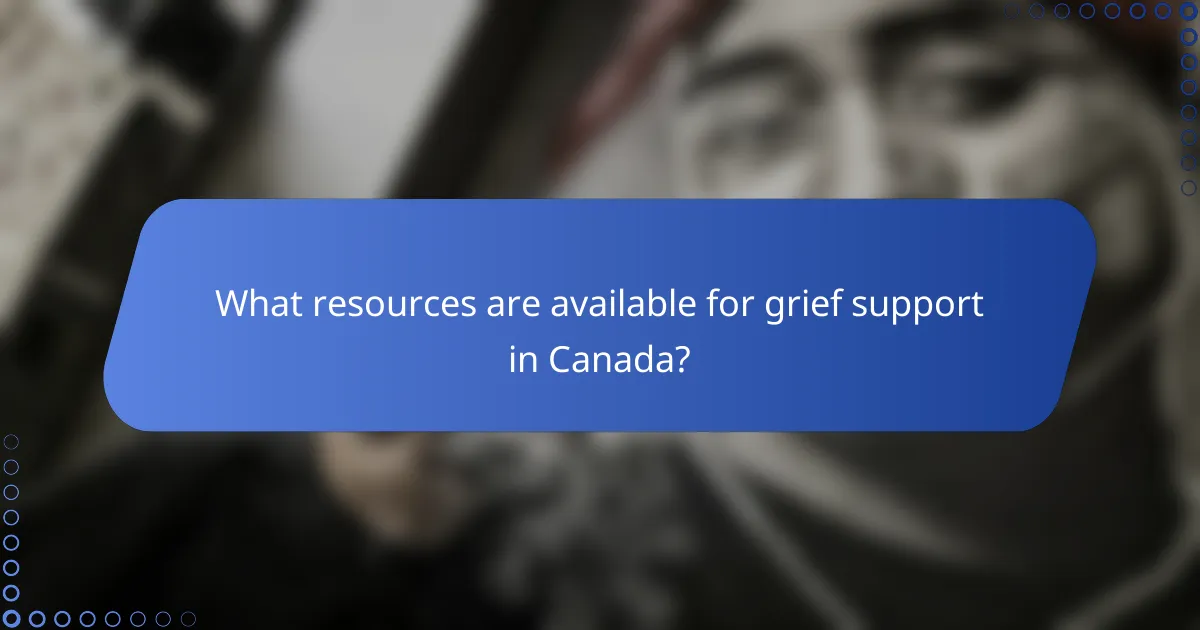
What resources are available for grief support in Canada?
In Canada, various resources exist to support individuals experiencing grief, including counseling services, support groups, and online platforms. These resources aim to provide emotional support, practical advice, and community connections to help individuals navigate their grief journey.
National and local organizations
Numerous national organizations offer grief support services across Canada. The Canadian Virtual Hospice provides resources and support for individuals dealing with grief and loss, while the Canadian Grief Alliance connects people with local support groups and counseling services. Additionally, many provinces have local organizations that cater specifically to community needs.
Local hospitals and hospices often have bereavement programs that offer counseling and support groups. It’s beneficial to check with community health centers or religious organizations, as they frequently provide grief support tailored to specific cultural or spiritual needs.
Online support platforms
Online support platforms have become increasingly popular for those seeking grief counseling and community support. Websites like Grief.com and the Grief Recovery Method offer resources, forums, and virtual support groups that allow individuals to connect with others experiencing similar losses.
Many of these platforms provide access to trained counselors through video calls or chat, making it easier for individuals to seek help from the comfort of their homes. When choosing an online platform, consider the credentials of the counselors and the type of support offered to ensure it meets your needs.
